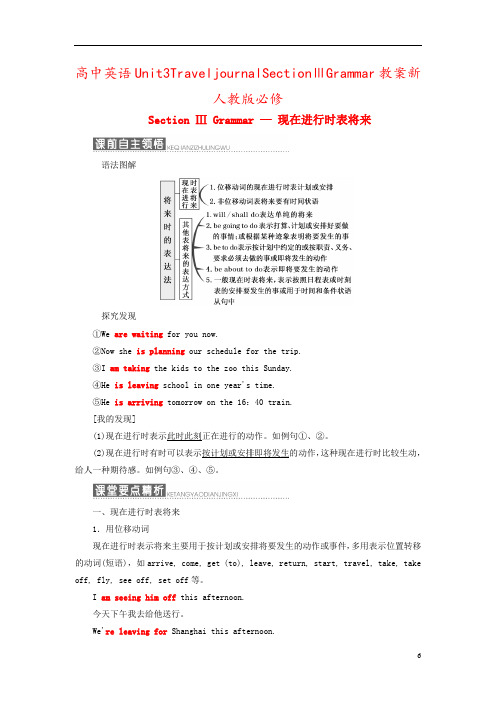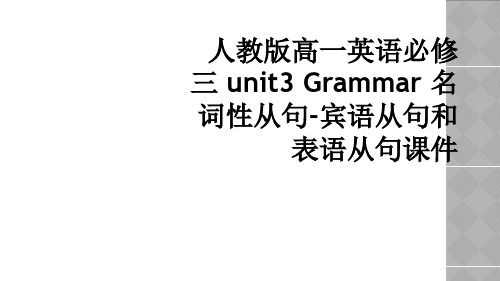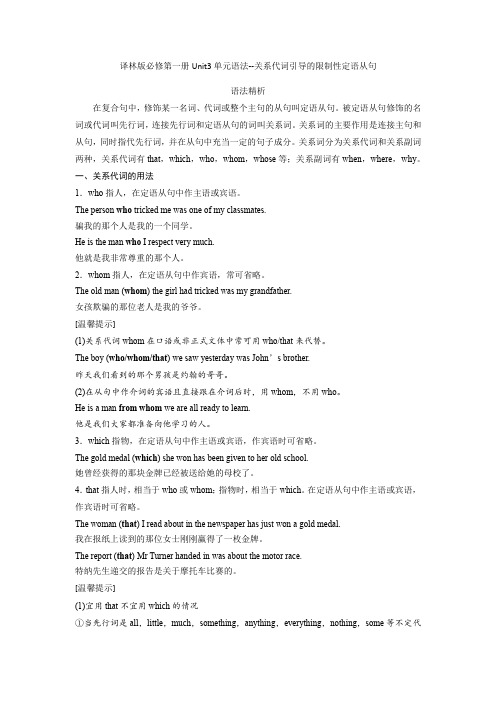Unit 3 Grammar 必修3 语法课
高中英语Unit3TraveljournalSectionⅢGrammar教案新人教版必修

高中英语Unit3TraveljournalSectionⅢGrammar教案新人教版必修Section Ⅲ Grammar —现在进行时表将来语法图解探究发现①We are waiting for you now.②Now she is planning our schedule for the trip.③I am taking the kids to the zoo this Sunday.④He is leaving school in one year's time.⑤He is arriving tomorrow on the 16:40 train.[我的发现](1)现在进行时表示此时此刻正在进行的动作。
如例句①、②。
(2)现在进行时有时可以表示按计划或安排即将发生的动作,这种现在进行时比较生动,给人一种期待感。
如例句③、④、⑤。
一、现在进行时表将来1.用位移动词现在进行时表示将来主要用于按计划或安排将要发生的动作或事件,多用表示位置转移的动词(短语),如arrive, come, get (to), leave, return, start, travel, take, take off, fly, see off, set off等。
I am seeing him off this afternoon.今天下午我去给他送行。
We're leaving for Shanghai this afternoon.今天下午我们将动身去上海。
The plane is arriving in 10 minutes.飞机将在10分钟内到达。
[即时演练1] 补全句子①She is_leaving_for Singapore tonight.她今晚将动身去新加坡。
②When are_you_setting_off_for your holiday?你什么时候动身去度假?③His plane is_taking_off at 9:20, so he must be at the airport by 8:30.他乘坐的飞机将于9:20起飞,所以他必须在8:30之前赶到机场。
人教版高一英语必修三 unit3 Grammar 名词性从句-宾语从句和表语从句课件

人教版高一英语必修 三 unit3 Grammar 名 词性从句-宾语从句和
My mother told me the sun ____ from the east. Tom asked me why KFC _____ its price again. (raise, rise)
rises raised
注意
用whether而不用if引导宾语从句情况
(whether/if 在宾从中不作成分, 表示“是否”,有时可互换) 1)介词+whether 3)whether to do
介词+宾语从句
l I lived in what you call “Ancient Greece”.
summary
介词 + whether + 陈述句 介词 + wh-词 + 陈述句
注意注意
l 宾语从句的时态必须与主句呼应: 1)主句—现在或将来时态,宾从—根据需要使用任何时态 2)主句—过去时态, 宾从—过去时态 【例外】: 主句—过去时态,宾从—一般现在时态 (宾从表示的是客观事实、自然现象或真理时)
My suggestion is that we (should) go and help him. 我的建议是我们去帮助他。
• 1.The trouble is ______ I have lost his addrtehsast . • 2.The reason ____ he was late was ____ he missed the first bus this morning. • 3.His proposal was that we _________ (collect)all the related information.
人教版高中英语必修三Unit 3 Section Ⅲ Grammar——省略

栏栏目目导导航航
(5)表语的省略。 阅读下列句子,指出句子省略的表语是什么。 ⑨—Are these your friends?——这些人是你的朋友吗? —Yes,they are.——是的,他们是我的朋友。 省略了:my friends
英语课件 /kejian/ yingyu /
栏栏目目导导航航
⑥(2016·浙江卷)—The movie starts at 8:30,and we can have a quick bite before we go.
——电影 8:30 开始,我们可以快速地吃点东西就走。 —Sounds great.See you at 8:10. ——听起来很好。8:10 见。 省略了:It
英语课件 /kejian/ yingyu /
栏栏目目导导航航
[观察例句] 1.A:Oh,I just love nachos mexican cornchips covered with cheese. B:Me,too. 2.A:So it's the food of many different cultures,all in one dish? B:Exactly. 3.A real mix of cultures here! 4.Can't wait!
英语课件 /kejian/ yingyu /
栏栏目目导导航航
⑬—He hasn't finished his homework. ——他还没有完成作业。 ——He ought to have. ——他本应该完成的。
英语课件 /kejian/ yingyu /
栏栏目目导导航航
(7)不定式的省略 A.答语中的有些动词后跟不定式做宾语时,可将其动词省略, 而保留 to,这样的动词或短语常见的有 want,wish,expect,hope, like,love,try,forget,prefer,mean,be going to,be about to,be supposed to 等。 ⑪—Will you go with me?——你要和我一起去吗? —Yes,I'd like to(go with you).——是的,非常乐意。
【课件】Unit3Grammar+and+usage表语从句课件牛津译林版选择性必修第三册

Practice :
①麻烦是我把他的地址(address)丢了。 The trouble is that I have lost his address.
②My suggestion is that we _s_h_o_u_l_d__te_l_l _(tell) him.
在表“建议,劝说,命令”的名词(suggestion, advice, request, demand 等)后面的表语从句中,谓语动词用“should +动词原形”(虚拟语气), should可省略
连接代词在表语从句中可充当主语、宾语、表语或定语,不能省略。
外研版高中英语必修三module3语法

5. He said, “Mother, the boy is very naughty.”
→He _____ very naughty. A. said his mother that the boy was B. said to his mother that the boy is C. told his mother that the boy was D. spoke to his mother that the boy
“Don’t be late again.”
→The teacher told the student not to be late again.
2. “Wake him up,” she said to me.
→ She told me to wake him up.
21
5. 过去时如有表示具体年份的状语,不 必改变时态。
2. “Have you seen the film?” he asked me.
→He asked me _______. A. had I seen the film B. have I seen the film C. if I have seen the film D. whether I had seen the film
→She asked whether we came from the same city.
19
3. 引语为特殊疑问句时,可以保留疑 问词,后跟陈述句。
1. He asked me, “Where are you going?”
→He asked me where I was going.
2. She asked him, “Whom do you want to see?”
Unit 3 Grammar 讲义-高一英语牛津译林版(2020)必修第一册

译林版必修第一册Unit3单元语法--关系代词引导的限制性定语从句语法精析在复合句中,修饰某一名词、代词或整个主句的从句叫定语从句。
被定语从句修饰的名词或代词叫先行词,连接先行词和定语从句的词叫关系词。
关系词的主要作用是连接主句和从句,同时指代先行词,并在从句中充当一定的句子成分。
关系词分为关系代词和关系副词两种,关系代词有that,which,who,whom,whose等;关系副词有when,where,why。
一、关系代词的用法1.who指人,在定语从句中作主语或宾语。
The person who tricked me was one of my classmates.骗我的那个人是我的一个同学。
He is the man who I respect very much.他就是我非常尊重的那个人。
2.whom指人,在定语从句中作宾语,常可省略。
The old man (whom) the girl had tricked was my grandfather.女孩欺骗的那位老人是我的爷爷。
[温馨提示](1)关系代词whom在口语或非正式文体中常可用who/that来代替。
The boy (who/whom/that) we saw yesterday was John’s brother.昨天我们看到的那个男孩是约翰的哥哥。
(2)在从句中作介词的宾语且直接跟在介词后时,用whom,不用who。
He is a man from whom we are all ready to learn.他是我们大家都准备向他学习的人。
3.which指物,在定语从句中作主语或宾语,作宾语时可省略。
The gold medal (which) she won has been given to her old school.她曾经获得的那块金牌已经被送给她的母校了。
4.that指人时,相当于who或whom;指物时,相当于which。
译林英语必修3Unit3Grammar and usage (共26张PPT)

结构:
主+谓语+ it +宾补(adj/n)+真正宾语
❖ I found it pleasant to be with your family. ❖ We think it our duty that we should help the poor. ❖ He found it hard to finish the work in time.
Example2
❖ Leave the windows closed when nobody is in. ❖ He considered the book interesting. ❖ They painted the wall white.
❖ adjective(adjective phrases)
C. With, bought D. Because, to buy
Homework
❖ 1.Review object complement
❖ 2.Finish the blank filling on page48 and the relevant exercise in the workbook.
变为被动语态时,不定式符号to必须保留
❖They made the boy work twelve hours a day. The boy was made to work twelve hours a
day.
❖People saw the middle-aged man enter the building.
2. He found them ____ at table___. A. sat; to play chess B. sitting; to play chess C. seated; playing chess D. seat; play the chess
译林版高中英语选必三Unit3 Grammar and usage 教案

《英语》(选择性必修·第三册)Unit 3 Back to the pastGrammar and usageI. Learning objectivesBy the end of the lesson, students will be able to:1. identify the use of predictive clauses;2. complete sentences with proper linking words to form predictive clauses;3. write a short paragraph based on given situations, using predictive clauses.II. Key competence focus1. Choose proper linking words to form predictive clauses.2. Make sentences with predictive clauses.III. Predicted area of difficulty1. Compare some linking words such as that and what, why and because, etc.2. Apply predictive clauses in different situations.IV. Teaching proceduresStep 1 Lead-in1. T asks Ss to define history by using the sentence pattern “History is…”, leading to the topic—predictive clauses.T: Boys and girls, what is history? Can you give a definition to history? You may say “History is …”.2. T shows two sentences on the screen after Ss give their answers.(1) History is a dialogue between the present and the past.(2) History is not what you thought. It is what you remember.3. T asks Ss to observe the two sentences and analyse their elements and structures.T: Please mark the sentence elements and structures. As we can see, both of them use SVP. A noun is used as the predictive in the first sentence, while a noun clause is used as the predictive in the second one. We call it a predictive clause.【设计意图:用一个开放式的问题(历史是什么?)激发学生的兴趣,学生可以给出任何不同的定义,然后引导学生观察教师给出的两个句子,引出表语从句的概念。
- 1、下载文档前请自行甄别文档内容的完整性,平台不提供额外的编辑、内容补充、找答案等附加服务。
- 2、"仅部分预览"的文档,不可在线预览部分如存在完整性等问题,可反馈申请退款(可完整预览的文档不适用该条件!)。
- 3、如文档侵犯您的权益,请联系客服反馈,我们会尽快为您处理(人工客服工作时间:9:00-18:30)。
作 状
语
现在分词作状语。表时间、原因、条件、结 果、伴随(方式)等。
Hearing the cry for help, he rushed out.(时间)
Being ill, he went home. (原因)
Seeing from the hill, you can get the whole town.(条件) European football is played in 80 countries, making it the most popular sport in the world. (NMET 98)(结果) He read a magazine waiting for the bus.(伴随)
现在分词作状语
1. Having finished the work, they left for home. 2. Not having received his letter, the mother wrote to her son again. 3. Having been told for many times, the student still didn’t know the answer. 4. When playing on the ground, he saw some money on the floor. 5. When asked about his secret of success, the man kept silent. 6. Dressed in a white coat, he looks like a doctor.
只接动名词作宾语的常见动词 有十六个:resist、mind、 suggest、delay、keep on、 look forward to、enjoy、 include、 appreciate、imagine、practise、 finish、succeed in、consider、 can’t help、miss。 太多了,怎么记呀?
C us to the ball. 8.We appreciate_________ A.them to invite B.to invite C.their inviting D.being invited
9.She returned home only to find the door open and something C _______. A.missed B.to be missing C.missing D.to be missed
C 5.________the exam, the boy was punished by his father. A. No passing B. Having passed C. Not passing D. Not having passed
C 6. Time________, I can have done it better. A. permit B. be permitted C. permitting D. to permit
3. Being exposed to the sun is harmful to our health.
4.It’s useless taking this kind of medicine. (no good, no point)
作表语
( 1 )动名词 ( 强调行 为) 1.My job is teaching. = Teaching is my job. 2.Her full-time job is laying eggs. =Laying eggs is her full-time job.
( 2 )现在分词(强调性 质) 1.The play is exciting. ≠ Exciting is the play. 2.The story he told us was very interesting. ≠Interesting was the story he told us.
作宾语:动名词
能跟现在分词作宾语补足语的常见 动词有这些,看看有什么好方法可 以将它们记住: make、let、have、look at、see、 watch、hear、listen to、notice、 feel。
对了,用“三让、三看、两 听、注意感觉”。多简单!
作定语
⑴动名词作定语表示性质或用途。
a washing machine
C the problem of old age. 10.She decided to devote herself _______ A.to study B.studying C.to studying D.study .
B 1. He sent me an E-mail, _______ to get further information.(2000上海卷) A. hoped B. hoping C. to hope D. hope D 2. - We slept with the light________ all night long last night. A. burnt B. to burn C. being burnt D. burning
C
D.to be laughed
2.You must do something to prevent your house__________. A.to be broken in B.from being broken in C.to break in D.from breaking in 3.They insisted on ______another chance to try. A.given B.giving C.being given D.to be given 4.—Where is my passport? I remember ________it here. —You shouldn't have left it here. Remember ________it with you all the time. A.to put;to take B.putting;taking C.putting;to take D.to put;taking 5.His room needs _______, so he must have it _________. A.painting; painted B.painted; painting C.painting; painting D.painted; painted
= a machine for washing
a swimming pool
= a pool for swimming This is a new washing machine.
作定语
⑵现在分词作定语表示动作。如果是单词,放在被
修饰的名词前;如果是短语,放就放在被修饰的名 词后。
•a developing country = a country which is developing •a sleeping boy= a boy who is sleeping •The man talking with my father is Mr. Wang. •China is a developing country.
B
B
C
A
6.After finishing his homework he went on parents. A.write B.writing C.wrote
_______a letter to his D
D.to write
7.The young trees we planted last week require _______ C with great care. A.looking after B.to look after C.to be looked after D.taken good care of
B 3. The brave man died, ________ his young wife nothing but a________ cottage. A. left; breaking B. leaving; broken C. left; broken D. to leave; breaking C 4. ________hard before, Tom is afraid of failing in the exam. A. Having been worked B. Not to have worked C. Having never worked D. Never have worked
•I have just finished doing my home work. •I suggested asking his brother for some money. •He keeps buying expensive maps. He must have more than 200 by now. 4.He imagined being praised by others.
别着急,我们来动动脑 筋。有了,你看:
抗议推迟盼喜报, 心想练成考不错
作宾语补足语:现在分词 I heard the girl singing in the classroom. I noticed a long queue outside the bank waiting for it to open. The baby watched his dad shaving his face with great interest. With the boy leading the road, we found the place easily. He found himself surrounded by others.
1.The boy reading a book under the tree is Tom. 2. The patient being treated is a VIP. 3. The house being built is my home. 4. the falling leaves the fallen leaves the boiling water the boiled water the developing countries the developed countries
